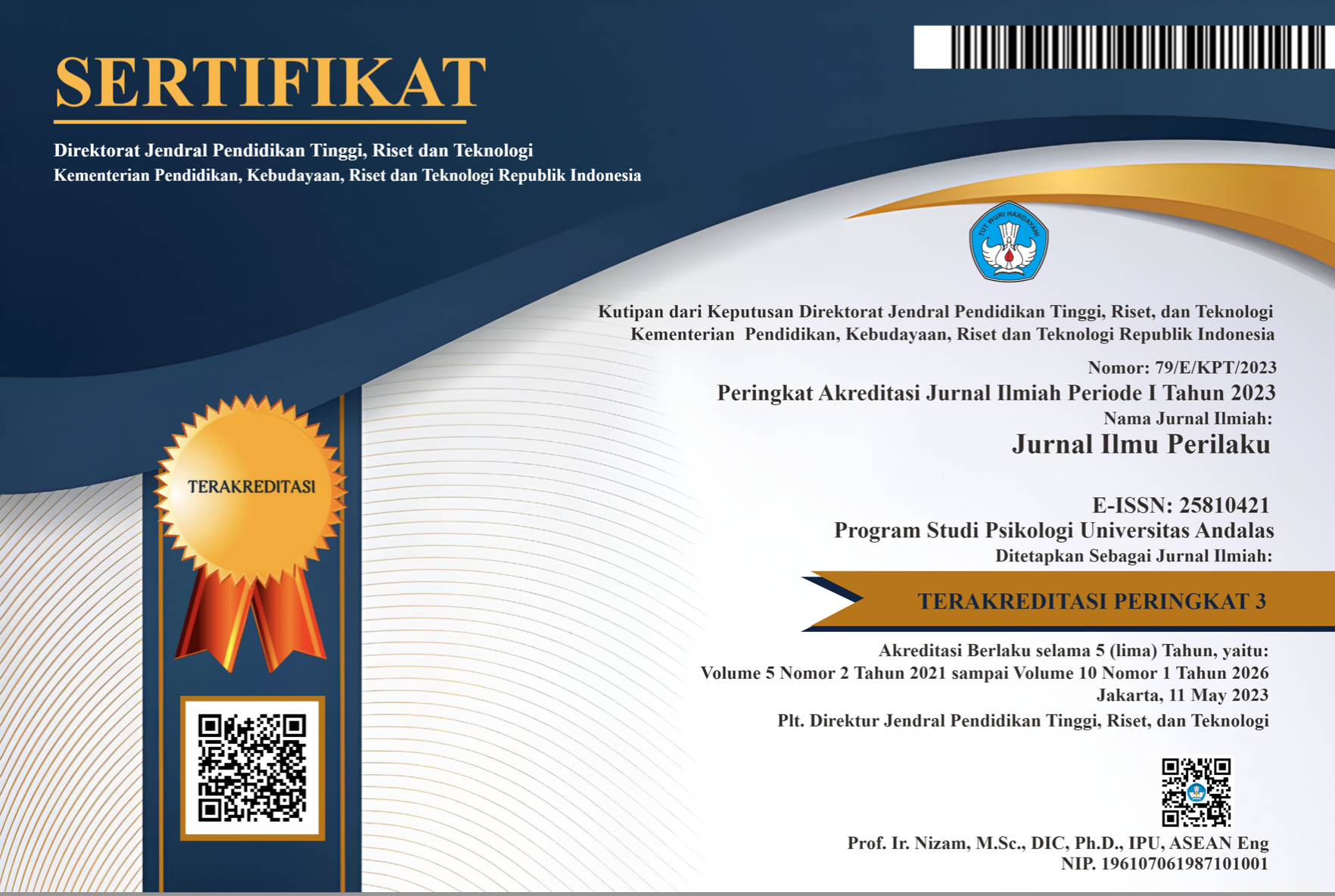Kontribusi Iklim Panti Asuhan dan Self Concept terhadap Motivasi Melanjutkan Studi Remaja Panti Asuhan ke Universitas
Abstract
The purpose of this research was to determine the contribution of the orphanage climate and self-concept to motivation in orphanage youth Muhammadiyah Purworejo to continue their studies to collage. Research respondent totaled 81 people selected using cluster random sampling. The scale used for data collection include the Motivation Scale for Continuing Studies in University (α=0,930), the Orphanage Climate Scale (α = 0.862), and the Self-Concept Scale (α=0,870). The results of the regression analysis showed that there was a strong contribution between the climate of the orphanage and self-concept to the motivation in orphanage youth Muhammadiyah Purworejo to continue studying at university (Fcount>Ftable, namely 53,151>3,11; p<0,05; R=0,759). In addition, the pearson correlation test of the second and third hypotheses of this study proved to show a strong enough significant correlation between the climate of the orphanage and the motivation in orphanage youth Muhammadiyah Purworejo to continue their studies to collage (p<0,05, r=0,423) and there was a strong significant correlation between self-concept and motivation in orphanage youth Muhammadiyah Purworejo to continue study in higher education (p<0.05; r=0,756). The effective contribution of the orphanage climate and self-concept to the motivation in orphanage youth Muhammadiyah Purworejo to continue their studies to college is 57,7%.
Downloads
References
Ali, M. (2017). Banyak lulusan sma/smk ogah lanjutkan kuliah. Sorot Purworejo. https://purworejo.sorot.co/berita-4638-from-widget-kulonprogo-link.html
Berzonsky, M. . (2001). Adolescent Development. Mac Milan Publishing. Co Inc.
Bilgin, O. (2021). The Effects of University Students’ School Climate on Their Motivation Levels. International Journal of Psychology and Educational Studies, 8(2), 112–121. https://doi.org/10.52380/ijpes.2021.8.2.370
Calhoun, F., & Acocella, J. . (1990). Psikologi tentang Penyesuaian dan Hubungan Kemanusiaan (edisi ketiga). IKIP Semarang Press.
Cherniss, C., & Goleman, D. (2001). The Emotionally Intelligent Workplace : How to Select for, Measure, and Improve Emotional Intelligence in Individuals, Groups, and Organizations. Jossey-Bass.
Cohen, J., Pickeral, C., & Mccloskey, M. (2009). The challenge of assessing school climate. Educational Leadership, 66. https://www.ascd.org/el/articles/the-challenge-of-assessing-school-climate
Depsos. (2004). Acuan Pelayanan Sosial Anak di Panti Sosial Asuhan Anak. Departemen Sosial Republik Indonesia.
Gage, N. A., Larson, A., Sugai, G., & Chafouleas, S. M. (2016). Student Perceptions of School Climate as Predictors of Office Discipline Referrals. American Educational Research Journal, 53(3), 492–515. https://doi.org/10.3102/0002831216637349
Guffey, S. (2020). School Climate. Early Career English Teachers in Action, 3, 72–103. https://doi.org/10.4324/9781315813646-10
Hadiyanto. (2016). Teori dan Pengembangan Iklim Kelas dan Iklim Sekolah. Kencana.
Hartiyani, N. (2011). Hubungan konsep diri dan kepercayaan diri dengan interaksi sosial remaja panti asuhan nur hidayah Surakarta. Digilib UNS. https://digilib.uns.ac.id/dokumen/detail/20936/Hubungan-Konsep-Diri-dan-Kepercayaan-Diri-dengan-Interaksi-Sosial-Remaja-Panti-Asuhan-Nur-Hidayah-Surakarta
Herawati, & Husaini, B. (2021). Hubungan Iklim Sekolah Dengan Motivasi Belajar Pada Siswa Di SMA Negeri 1 Rikit Gaib. Journal of Education Science (JES), 7(2), Hal. 118-137.
Hidayati, S. R. N., & Savira, S. I. (2021). Hubungan Antara Konsep Diri dan Kepercayaan Diri Dengan Intensitas Penggunaan Media Sosial Sebagai Moderator Pada Mahasiswa Psikologi Universitas Negeri Surabaya. Character: Jurnal Penelitian Psikologi, 8(03), 1–11. https://ejournal.unesa.ac.id/index.php/character/article/view/41122
Hoy, W. ., & Miskel, C. . (2013). Educational administration: Theory, Research, and Practice, 9th Edition. McGraw-Hill.
Husnayaini, I. (2019). Self-Concept and Achievement Motivation of High School Students. Tarbawy: Jurnal Pendidikan Islam, 6(2), 113–123. http://0-search.ebscohost.com.ignacio.usfca.edu/login.aspx?direct=true&db=eric&AN=ED543974&site=ehost-live&scope=site
Kavousipour, S., Noorafshan, A., Pourahmad, S., & Dehghani-Nazhvani, A. (2015). Achievement motivation level in students of Shiraz University of Medical Sciences and its influential factors. Journal of Advances in Medical Education & Professionalism, 3(1), 26–32. http://www.ncbi.nlm.nih.gov/pubmed/25587552%0Ahttp://www.pubmedcentral.nih.gov/articlerender.fcgi?artid=PMC4291505
Khan, A., & Alam, S. (2015). Self-Concept in Relation to Achievement Motivation of High School Students. International Journal of Indian Psychology, 2(4). https://doi.org/10.25215/0204.006
Khoirunnisa, S., Ishartono, I., & Resnawaty, R. (2015). Pemenuhan Kebutuhan Pendidikan Anak Asuh Di Panti Sosial Asuhan Anak. Prosiding Penelitian Dan Pengabdian Kepada Masyarakat, 2(1), 69–73. https://doi.org/10.24198/jppm.v2i1.13258
Lestari, M., Zakso, A., & Hidayah, R. Al. (2020). Faktor-Faktor Penyebab Rendahnya Minat Melanjutkan Pendidikan Ke Perguruan Tinggi (Kasus Pada Remaja Di Desa Sepadu). Jurnal Pendidikan Dan Pembelajaran Khatulistiwa, 9(7), 1–8. https://jurnal.untan.ac.id/index.php/jpdpb/article/view/41380
McClelland, D. . (1987). Human Motivation. Cambridge University Press.
Mecadinisa, N. (2018). Berdasarkan Survei, 90 Persen Anak di 8000 Panti Asuhan Masih Punya Orangtua. https://www.liputan6.com/fashion-beauty/read/3605338/berdasarkan-survei-90-persen-anak-di-8000-panti-asuhan-masih-punya-orangtua
Merina, R. . (2014). Konseling kelompok untuk meningkatkan konsep diri remaja di panti asuhan. Psychological Journal Science and Practice, 2. https://ejournal.umm.ac.id/index.php/pjsp/article/view/2154
Mittu, H., & Zhimomi, L. K. (2019). Influence of school climate on achievement motivation of higher secondary school students. International Journal of Recent Technology and Engineering, 7(6), 1804–1807.
Noeei, Khayyer, M., Kazemi, S., & Sohrabi Shegefti, N. (2020). Relationship between School Climate and Achievement Motivation in High School Students. Iranian Evolutionary and Educational Psychology, 2(4), 294–300. https://doi.org/10.52547/ieepj.2.4.294
Prabadewi, K. D. L., & Widiasavitri, P. N. (2014). Hubungan Konsep Diri Akademik dengan Motivasi Berprestasi pada Remaja Awal yang Tinggal di Panti Asuhan di Denpasar. Jurnal Psikologi Udayana, 1(2), 261–270. https://doi.org/10.24843/jpu.2014.v01.i02.p05
Prastiwi, M. (2021, June 29). 1,9 Juta Lulusan SMA/SMK/MA di Indonesia Tidak Kuliah. https://www.kompas.com/edu/read/2021/06/29/093000371/1-9-juta-lulusan-sma-smk-ma-di-indonesia-tidak-kuliah?page=all
Pujianto. (2015). Faktor-faktor Penyebab Anak Tidak Melanjutkan Pendidikan ke Perguruan Tinggi. Jurnal Pendidikan Dan Pembelajaran Khatulistiwa, 4(9), 1–15.
Purnamasari, D. . (2020). Wapres: Penduduk Indonesia Lanjutkan Pendidikan Tinggi Masih Terbatas. https://nasional.kompas.com/read/2020/09/07/10100901/wapres-penduduk-indonesia-lanjutkan-pendidikan-tinggi-masih-terbatas.
Putri, F. A., Monika, S., & Ninawati. (2016). Hubungan Konsep Diri Dengan Motivasi Berprestasi Pada Mahasiswa Akselerasi Dan Siswa Reguler. Provitae: Jurnal Psikologi Pendidikan, 7(1), 1–19.
Rahman, F., Abdillah, H. Z., & Hidayah, N. (2020). Determinasi Diri Sebagai Prediktor School Wellbeing pada Siswa SMP. Psikoislamedia : Jurnal Psikologi, 5(1), 94. https://doi.org/10.22373/psikoislamedia.v5i1.6336
Rahmawati, E. (2022). Manfaat melanjutkan pendidikan ke perguruan tinggi. Gilang Biantara. https://nusamandiri.info/sebelum-kamu-memutuskan-kuliah-pahami-dulu-tujuan-dan-manfaatnya/
Rohmah, A. ., Suhendri, & Mujiono. (2022). Hubungan antara Konsep Diri dengan Motivasi Belajar Siswa Kelas XI IPS SMA Institut Indonesia Semarang. G-COUNS: Jurnal Bimbingan Dan Konseling, 6(2), 269–275.
Samrin, S., Syahrul, S., Kadir, S. F., & Maknun, D. R. L. (2020). Pengaruh Kondisi Sosial Ekonomi terhadap Motivasi Belajar Siswa. Shautut Tarbiyah, 26(2), 250. https://doi.org/10.31332/str.v26i2.2400
Sardiman, A. . (2014). Interaksi dan Motivasi Belajar-Mengajar. PT. Rajagrafindo Persada.
Toriq, A. (2017). Distribusi KIP untuk Yatim Piatu, Mendikbud Andalkan Data Panti Asuhan. https://news.detik.com/berita/d-3390949/distribusi-kip-untuk-yatim-piatu-mendikbud-andalkan-data-panti-asuhan
Uno, H. B. (2017). Teori Motivasi dan Pengukurannya: Analisis di Bidang Pendidikan. Bumi Aksara.
Widya, K. S. (2021). Hubungan Antara Efikasi Diri Dengan Motivasi Belajar Pada Siswa Smp Negeri 1 Waru Di Masa Pandemi Covid-19. PD ABKIN JATIM Open Journal System, 2(2), 68–76. https://ojs.abkinjatim.org/index.php/ojspdabkin/article/view/122%0Ahttps://ojs.abkinjatim.org/index.php/ojspdabkin/article/download/122/108
The non-commercial use of the article is governed by the Creative Commons Attribution license as currently displayed on Creative Commons Attribution-NonCommercial-ShareAlike 4.0 International License.
JIP's spirit is to disseminate articles published are as free as possible. Under the Creative Commons license, JIP permits users to copy, distribute, display, and perform the work for non-commercial purposes only. Users will also need to attribute authors and JIP on distributing works in the journal.
Please find the rights and licenses in Jurnal Ilmu Perilaku (JIP).
- License
The non-commercial use of the article will be governed by the Creative Commons Attribution license as currently displayed on Creative Commons Attribution-NonCommercial-ShareAlike 4.0 International License.
- Author’s Warranties
The author warrants that the article is original, written by stated author(s), has not been published before, contains no unlawful statements, does not infringe the rights of others, is subject to copyright that is vested exclusively in the author and free of any third party rights, and that any necessary written permissions to quote from other sources have been obtained by the author(s).
- User Rights
JIP's spirit is to disseminate articles published are as free as possible. Under the Creative Commons license, JIP permits users to copy, distribute, display, and perform the work for non-commercial purposes only. Users will also need to attribute authors and JIP on distributing works in the journal.
- Rights of Authors
Authors retain the following rights:
- Copyright, and other proprietary rights relating to the article, such as patent rights,
- The right to use the substance of the article in future own works, including lectures and books,
- The right to reproduce the article for own purposes, provided the copies are not offered for sale,
- The right to self-archive the article.
- Co-Authorship
If the article was jointly prepared by other authors, the signatory of this form warrants that he/she has been authorized by all co-authors to sign this agreement on their behalf, and agrees to inform his/her co-authors of the terms of this agreement.
- Termination
This agreement can be terminated by the author or JIP upon two months’ notice where the other party has materially breached this agreement and failed to remedy such breach within a month of being given the terminating party’s notice requesting such breach to be remedied. No breach or violation of this agreement will cause this agreement or any license granted in it to terminate automatically or affect the definition of JIP.
- Royalties
This agreement entitles the author to no royalties or other fees. To such extent as legally permissible, the author waives his or her right to collect royalties relative to the article in respect of any use of the article by JIP or its sublicensee.
- Miscellaneous
JIP will publish the article (or have it published) in the journal if the article’s editorial process is successfully completed and JIP or its sublicensee has become obligated to have the article published. JIP may conform the article to a style of punctuation, spelling, capitalization, referencing and usage that it deems appropriate. The author acknowledges that the article may be published so that it will be publicly accessible and such access will be free of charge for the readers.










